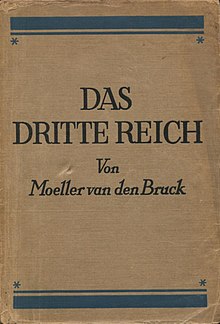| This article includes a list of references, related reading, or external links, but its sources remain unclear because it lacks inline citations. Please help improve this article by introducing more precise citations. (March 2019) (Learn how and when to remove this message) |
 First edition First edition | |
| Author | Arthur Moeller van den Bruck |
|---|---|
| Language | German |
| Subject | German nationalism |
| Publication date | 1923 |
| Media type | Print book |
| Text | Das Dritte Reich at Internet Archive |
Das Dritte Reich (German for 'The Third Reich') is a 1923 book by the German author Arthur Moeller van den Bruck, whose ideology heavily influenced the Nazi Party. The book formulated an "ideal" of national empowerment, which found many adherents in a Germany desperate to rebound from the Treaty of Versailles.
Concept
Moeller van den Bruck's reich is not a state in the usual sense of the word but the ideal condition and the only way in which the scattered German people can achieve a common purpose and destiny. However, this should not be a limited state, and he saw the German Empire established by Otto von Bismarck as an imperfect reich, as it did not include Austria, which survived on from "our First Reich", side by side with "our Second Reich". According to van den Bruck, "Our Second Reich was a Little-German Reich which we must consider only as a stepping stone on our path to a Greater German Reich".
Van den Bruck called for the Weimar Republic to be replaced through a new revolution from the right. He also called for a new political movement that would embrace both Prussian socialism and nationalism, a unique form of German fascism. He takes all of his philosophical cues from the work of Nietzsche, "who stands at the opposite pole of thought from Marx". The one contemporary politician that he praises above all the others is Benito Mussolini.
Implications
On the eve of the book's publication, van den Bruck inserted a preface in which he tried to distance himself from possible future implications: "The Third Reich is but a philosophical idea and not for this world, but for the hereafter. Germany could well perish dreaming the Third Reich dream". To pursue the philosophical idea, he believed that Germany would need an Übermensch of the type described by Nietzsche but that this individual was not Adolf Hitler or anyone else living.
For van den Bruck, Germany's great misfortune lay in the political system created by the Weimar Republic, which had competitive parties and liberal ideologies. An admirer of Benito Mussolini, he called for a strong leader.
Soon after the collapse of the Munich Putsch, he wrote: "There are many things that can be said against Hitler, and I have sometimes said them. But one thing you have to give him credit for: he is a fanatic in his devotion to Germany. He is undone, though, by his proletarian primitive ways. He does not know how to give an intellectual basis to his Nazi party. Hitler is all passion but lacks sense or proportion. A heroic tenor, not a hero. (Meaning, in an operatic sense, an aspiring but ultimately comical figure full of pathos rather than an actual protagonist)". Hitler, in the eyes of van den Bruck, was no Mussolini. Those were the last words that the author is known to have written before his suicide in 1925.
References
- Fritz Stern. The Politics of Cultural Despair: A Study in the Rise of the Germanic Ideology. University of California Press, 1974. ISBN 0-520-02626-8
- Stan Lauryssens. The Man Who Invented the Third Reich. History Press, 2011. ISBN 978-075-246816-7